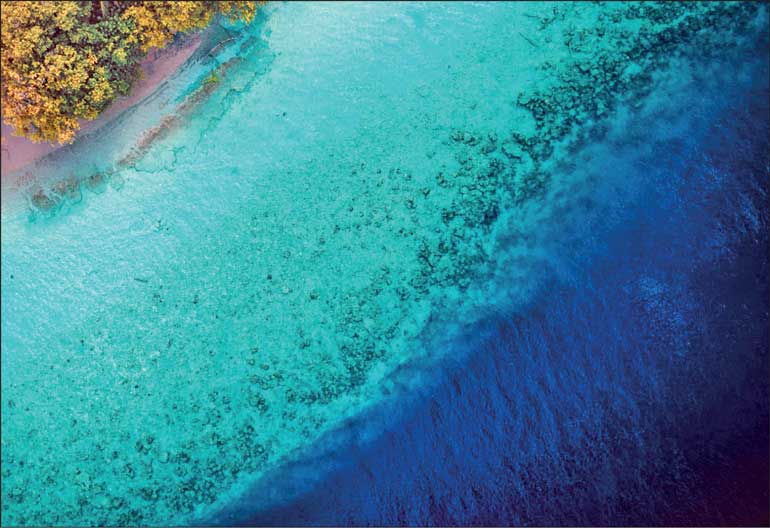Thursday Feb 19, 2026
Thursday Feb 19, 2026
Saturday, 25 March 2023 00:09 - - {{hitsCtrl.values.hits}}

Linking national actions with global ocean governance framework provides a way to benefit from synergies and enhance policy coherence
 Oceans are a key part of the planetary ecosystem and critical for climate change mitigation, adaptation, environmental conservation, pollution control, and sustainable development. Especially for coastal and island countries such as Sri Lanka, ocean health is closely linked to the wellbeing and prosperity of human communities, and harnessing ocean power presents a significant opportunity.
Oceans are a key part of the planetary ecosystem and critical for climate change mitigation, adaptation, environmental conservation, pollution control, and sustainable development. Especially for coastal and island countries such as Sri Lanka, ocean health is closely linked to the wellbeing and prosperity of human communities, and harnessing ocean power presents a significant opportunity.
However, to benefit from ocean resources holistically and in the long-term, these resources need to be managed in sustainable, nature-positive, climate-friendly, and inclusive ways. It is therefore important to understanding existing and upcoming governance and policy frameworks on the national, regional, and global level that can facilitate such approaches and protect both the environment and human communities.
The central role of oceans
From a climate change mitigation lens, oceans are indispensable, as they absorb almost a quarter of all anthropogenic CO2 emissions and 90% of the excess heat caused by global warming. They stabilise the Earth’s climatic systems and produce approximately half of the Earth’s oxygen. Furthermore, oceans support climate change adaptation by providing livelihoods, transport, a potential source of renewable energy (in the form of wave energy, ocean thermal, or offshore wind), and a host of ecosystem services. The world’s seas are also habitats to a wealth of biodiversity and host an incredible variety of species of marine animals, plants, and microorganisms.
On the flipside, oceans are facing climate change, biodiversity loss, pollution, and other threats. Ocean acidification, ocean warming, species extinction, overfishing, plastic pollution, waste dumping, oil spills, shipping accidents, and various human activities all present serious challenges to marine and coastal ecosystems that need to be addressed through concrete plans and actions.
Within a country’s territorial sea (extending 12 nautical miles from the coast) and exclusive economic zone (extending 200 nautical miles), such actions mainly fall under national jurisdictions and can be guided by domestic frameworks. In many cases, these national frameworks also connect to regional processes, such as regional fisheries management organisations or the Indian Ocean Rim Association (IORA), of which Sri Lanka is a part. Globally, the importance of oceans has also been highlighted in climate change negotiations—as just one example, the cover decision of the recent Conference of Parties (COP27) to the United Nations Framework Convention on Climate Change (UNFCCC) contains a sub-section focused on oceans—or in the discussions around a global treaty on plastic pollution, which explicitly includes “plastic pollution […] in the marine environment.”
The high seas treaty
However, these frameworks only address certain aspects of ocean governance, and countries’ jurisdictions do not extend to the high seas, which form the majority part of the world’s oceans. Accordingly, a new treaty is needed to protect “biodiversity in oceans beyond national jurisdiction,” (BBNJ) which refers to living marine resources found in the high seas and on the seabed. The high seas contain a significant part of overall marine biodiversity, including many unique and/or vulnerable species that are already threatened by overfishing, pollution, and the impacts of climate change.
An International Seabed Authority was established under the United Nations Convention on the Law of the Sea in 1994, but there has not been any governing body or international legally binding instrument to safeguard biodiversity in the open ocean so far. However, after long and strenuous negotiations in New York earlier this month, a landmark agreement was reached on a new “high seas treaty” to govern BBNJ. Countries will need to formally adopt the proposed treaty at a resumed session, this presents an important milestone and step forward in an area that needed urgent attention.
The preamble which is expected to be part of the new treaty highlights “the need to address, in a coherent and cooperative manner, biodiversity loss and degradation of ecosystems of the oceans, due to, in particular, climate change impacts […], ocean acidification, pollution […], and unsustainable use.” Key thematic areas covered by the treaty include marine protected areas, sharing of marine genetic resources, and requirements for environmental impact assessments for deep-sea activities.
Opportunities for action
There are several possible ways in which national actions can link to these global frameworks and enhance action on all levels. Bringing together different stakeholders—such as those working on coastal conservation, fisheries, marine ecosystems, shipping, renewable energy, tourism, coastal development, and trade—can also help to strengthen policy coherence and create greater awareness of the interlinkages between climate action, environmental protection, waste management, and economic growth.
By actively engaging in the UNFCCC process as well as the development of the high seas treaty and the global plastic treaty, countries such as Sri Lanka can highlight national-level work, identify gaps, exchange technical expertise, and gain access to support, funding, and technology transfer. As just one example, nature-based solutions can bridge climate action and biodiversity conservation and create significant benefits in terms of mitigation (“blue carbon”) as well as livelihoods, environmental services, and disaster risk reduction for coastal communities. Similarly, financial instruments such as blue bonds or debt-for-nature swaps can help to access funding for a blue economy while risk transfer mechanisms can contribute to the resilience and sustainability of interventions. Other potential avenues of action include blue entrepreneurship, youth engagement on oceans and climate action, and public-private partnerships, which can connect the national to the global level and offer many co-benefits for climate action, economic empowerment, and overall prosperity.
(The writer works as Director – Research and Knowledge Management at SLYCAN Trust, a non-profit think tank based in Sri Lanka. His work focuses on climate change, adaptation, resilience, ecosystem conservation, just transition, human mobility, and a range of related issues. He holds a Master’s degree in Education from the University of Cologne, Germany and is a regular writer to several international and local media outlets.)